The top local recipients of Hall taxes
Here is a look at the top local government recipients of Tennessee's Hall tax on income from stocks and bonds in the budget year ending June 30. The tax brought in about $302 million last year, with about one-third directed back to the counties and cities where those who paid the tax live. Memphis: $14.8 million Nashville: $14.7million Knoxville: $10 million Brentwood: $4.2 million Chattanooga: $4.2 million Franklin: $3.7 million Knox County: $3.3 million Germantown: $3.1 million Cleveland: $2.2 million Belle Meade: $2.1 million Davidson County: $1.9 million Hamilton County: $1.6 million Shelby County: $1.5 million Murfreesboro: $1.2 million Collierville: $1.2 million Williamson County: $1.2 million Kingsport: $1.1 million Signal Mountain: $960,067 Loudon County: $909,116 Johnson City: $891,086 Gallatin: $869,060 Hendersonville: $814,449
NASHVILLE - While some GOP lawmakers are citing Tennessee's $600 million budget surplus in 2014-105 as justification for doing away with the state's tax on stock dividends and certain interest in 2016, Gov. Bill Haslam says the issue isn't as simple as that.
"I've always said it's easy to say let's do away with this," Haslam, a Republican, told reporters earlier today. "It's a lot harder to say what are you going to do about that revenue going away."
As he fashions his proposed budget for next year, Haslam said the state also faces pressures on all sides. They include two lawsuits from school districts, including one involving Hamilton County, charging the state is short-changing them on education. Meanwhile, costs for TennCare, the state's Medicaid program for the poor, are increasing.
Moreover, Haslam said, "we need to pay some prison guards more. We need more frontline [Children's Services] workers, I can go on and on."
Last week, Senate Judiciary Committee Chairman Brian Kelsey, R-Germantown, announced he will renew his push to repeal the nearly 85-year-old Hall Income Tax come January. In doing so, Kelsey cited the state's 2015-2016 fiscal year which ended with almost $606 million more than expected.
Most of the surplus came in the state's general fund which funds most government functions except for a few areas, primarily transportation.
"This is a bad tax and it needs to go," Kelsey told The Commercial Appeal in Memphis. "It especially hurts our seniors and those who have saved for retirement.
In 2014-2015, the Hall Tax generated $303 million. But because the state gets 5/8ths of that with the rest going to local governments of localities where the taxpayer resides, the state saw only about $189 million of that.
"Lawmakers who believe in limited government should commit to giving this money back to the taxpayers before it gets spent on pet projects," Kelsey said.
But hoping to soften stiff opposition to elimination of the tax by local governments, Kelsey is proposing the state still send local governments the same money they now get but freeze it at today's dollar amounts.
The Hall Tax, named after the lawmaker who pushed it through in 1931, levies a 6 percent rate on taxable dividends and interest. But it exempts interest on savings accounts, certificates of deposit, government bonds and a number of other areas.
Republicans over the past five years have chipped away at the tax by raising the exemption level for retirees.
Kelsey told The Commercial Appeal he believes the chances of killing the tax outright effective in 2017 "are much larger next year than they have been in the last three years because we are now seeing consistent revenue growth."
Haslam noted that some lawmakers are already proposing using some of the surplus for roads as they argue against Haslam's push for more transportation revenue.
"I've made a joke that of our surplus this year we've spent it three times already," Haslam said. "But I think the other thing we have to distinguish is the difference between one-time money, which is what the surplus is, and then recurring funds. Those are two very different things.
"I certainly wouldn't want to appropriate one-time money assuming it's always going to be there," the governor added.
Surpluses from unanticipated revenue growth are usually recognized to some extent in the following annual spending plan, but the level can and often is lower than the surplus.
